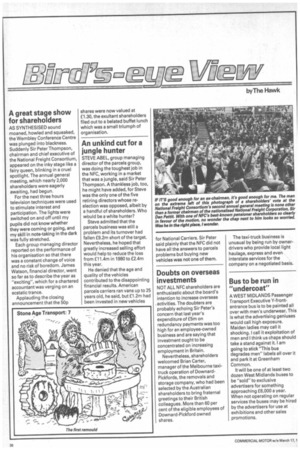A great stage show for shareholders
Page 38

If you've noticed an error in this article please click here to report it so we can fix it.
AS SYNTHESISED sound moaned, howled and squeaked, the Wembley Conference Centre was plunged into blackness. Suddenly Sir Peter Thompson, chairman and chief executive of the National Freight Consortium, appeared on the inky stage like a fairy queen, blinking in a cruel spotlight. The annual general meeting, which nearly 2,000 shareholders were eagerly awaiting, had begun.
For the next three hours television techniques were used to stimulate interest and participation. The lights were switched on and off until my pupils did not know whether they were coming or going, and my skill in note-taking in the dark was fully stretched.
Each group managing director reported on the performance of his organisation so that there was a constant change of voice and no risk of boredom. James Watson, financial director, went so far as to describe the year as "exciting", which for a chartered accountant was verging on an ecstatic trance.
Applauding the closing announcement that the 50p shares were now valued at £1.30, the exultant shareholders filed out to a belated buffet lunch which was a small triumph of organisation.
An unkind cut for a jungle hunter
STEVE ABEL, group managing director of the parcels group, was doing the toughest job in the NEC, working in a market that was a jungle, said Sir Peter Thompson. A thankless job, too, he might have added, for Steve was the only one of the five retiring directors whose reelection was opposed, albeit by a handful of shareholders. Who would be a white hunter?
Steve admitted that the parcels business was still a problem and its turnover had fallen £9.2m short of the target. Nevertheless, he hoped that greatly increased selling effort would help to reduce the loss from £11.4m in 1980 to £2.4m this year.
He denied that the age and quality of the vehicles contributed to the disappointing financial results. American parcels carriers ran vans up to 25 years old, he said, but £1.2m had been invested in new vehicles for National Carriers. Sir Peter said plainly that the NEC did not have all the answers to parcels problems but buying new vehicles was not one of them.
















































































































